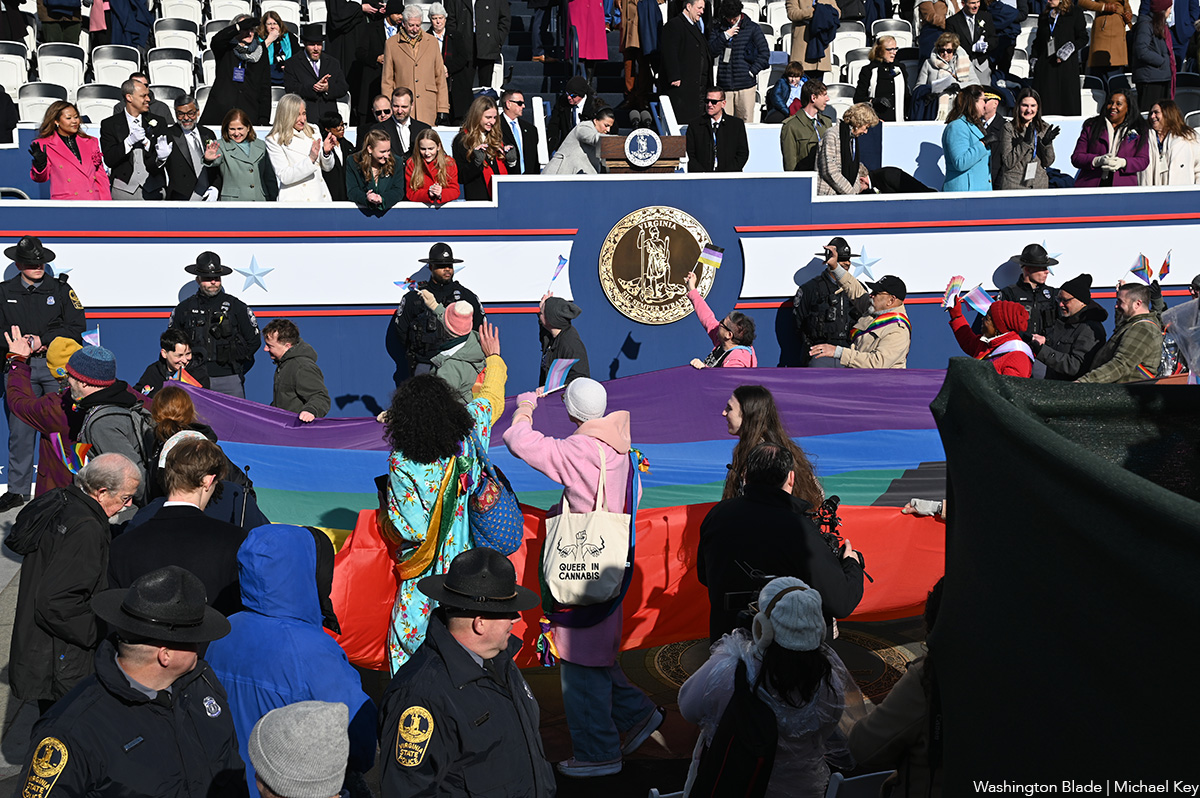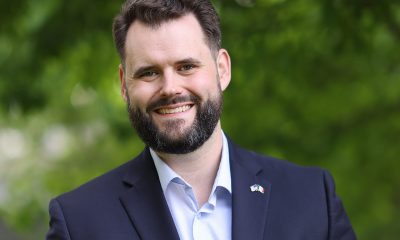Local
Silverman wins vote, falls short of Stein Club endorsement
Five Democrats running in at-Large D.C. Council race compete for LGBT group’s support
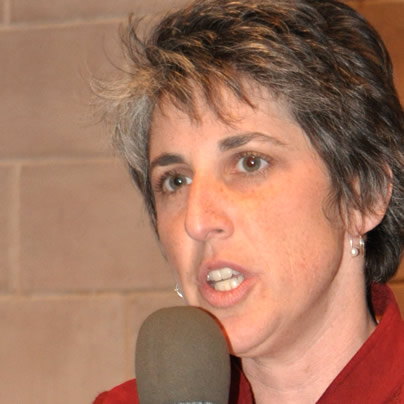
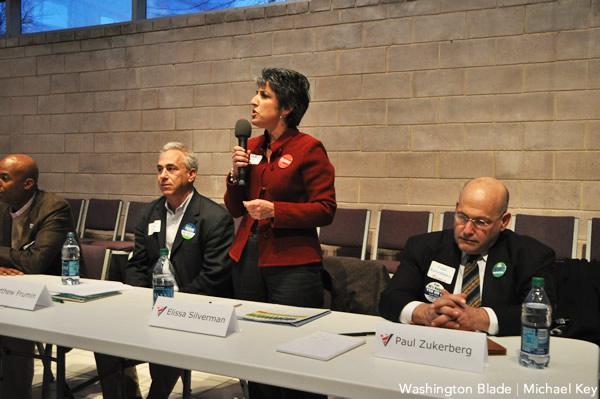
Elissa Silverman (Washington Blade photo by Michael Key)
City Council candidate Elissa Silverman beat her four fellow Democratic rivals Thursday night at an endorsement forum sponsored by the Gertrude Stein Democratic Club but fell short of capturing a 60 percent vote total needed to win the club’s endorsement.
Silverman, a budget analyst and former journalist, received 39 votes, or 54.9 percent, in a second ballot runoff against interim Council member Anita Bonds, who received 26 votes, or 36.6 percent. Five club members voted to “abstain” from choosing a candidate in the runoff balloting.
The five Democrats who competed for the Stein Club endorsement and two others – a Republican and a Statehood Green Party candidate – are running in an April 23 special election for an at-large D.C. Council seat. The seat became vacant when Council member Phil Mendelson (D-At-Large) won election last year as Council Chair.
Earlier this year, the D.C. Democratic State Committee, which Bonds chairs, chose her to fill the seat as an interim Council member until the special election is held.
At the Stein Club forum Thursday night, Silverman received 43.6 percent in a first ballot vote, with Bonds receiving 32 percent. Attorney and Ward 3 Advisory Neighborhood Commissioner Matthew Frumin received 14 percent on the first ballot; former at-large Council member Michael A. Brown received 7 percent. Attorney Paul Zuckerberg, an advocate for marijuana decriminalization, received 2.8 percent.
Close to one hundred people turned out for the forum, which was held at the Metropolitan Community Church of Washington on Ridge Street, N.W., in the city’s Shaw neighborhood.
The voting took place after the five candidates gave opening remarks and answered questions presented by club member Earl Fowlkes, who served as the forum’s moderator. In response to questions by Fowlkes and written questions by audience members, each of the candidates expressed strong support for LGBT rights.
Many of the questions addressed non-LGBT issues, prompting the candidates to discuss their views on education reform, homelessness, unemployment, and the city’s procurement policies among other issues.
“I would have loved to have gotten the endorsement, but we had a majority of Stein Club members support me,” Silverman said after the forum. “So I’m thrilled.”
Silverman’s strong showing came after 14 prominent LGBT activists, most of whom are Stein Club members, announced their support for Silverman in an invitation to an LGBT “meet and greet” event for the candidate to be held at a Dupont Circle area gay bar. Among them are former club treasurer and transgender activist Alexandra Beninda and club members Barbara Helmick, Gregory Cendana, and Jerry Clark.
Another ten prominent Stein Club members, including former club presidents Kurt Vorndran and Lateefah Williams, announced they are hosting a separate “meet and greet” for Bonds.
“I think the candidates did a very good job tonight,” said Stein Club President Martin Garcia. “I think all of the candidates have a very good understanding of our issues. Unfortunately, today the club couldn’t come to a consensus on just one,” he said.
“But that doesn’t mean we’re not going to be out and about participating in the election as we come closer to April 23,” Garcia said.
Frumin, who received the highest rating on LGBT issues from the Gay and Lesbian Activists Alliance, a +7 out of a possible +10 earlier this month, said he was pleased with the vote total he received at the Stein Club forum.
“I didn’t do the process of recruiting members to come so you have voters who are there,” he said. “So people who voted for me were people who were hearing from me tonight for the first time, and I think getting the votes I got was a pretty good accomplishment.”
Supporters of Brown noted that Brown received strong support from LGBT activists in his previous successful race for an at-large Council seat as an independent. They said his vote total of just 7 percent at Thursday’s Stein Club forum was due, in part, to a better effort by Silverman and Bond to turn out supports for the forum.
Brown lost his re-election bid in November to independent David Grosso, who ran as a reform candidate. Political observers say Brown’s widespread name recognition makes him a strong contender in the April 23 special election, where a low voter turnout is expected.
Republican Patrick Mara is also considered a viable candidate in the special election because he has attracted a large number of Democratic voters, including gay Democrats, in two previous races for a Council seat.
Silverman worked as a reporter for the Washington City Paper as the paper’s “Loose Lips” political columnist before becoming a reporter at the Washington Post. Since 2009 she has worked as a budget analyst for the D.C. Fiscal Policy Institute.
She told the Blade after the forum that her strong showing from Stein Club members was due to her positions and her approach to addressing both LGBT and non-LGBT issues.
“I think Stein Club members care about this city, they care about this city’s ethics, they care about spending our tax dollars well, they care about being an inclusive city,” she said. “Those are all things that are central to my campaign.”
During a discussion among club members following the appearance of the candidates, Stein Club treasurer Barrie Daneker urged members to vote for Bonds.
“Anita Bonds attended her first Gertrude Stein meeting in 1978,” he said. “She’s been supportive of our community for a long time…We couldn’t have a better candidate for the City Council,” Daneker said, on LGBT and all other issues.
Virginia
Two gay candidates running in ‘firehouse’ Va. House of Delegates primary in Alexandria
Kirk McPike, Gregory Darrall hope to succeed delegate vying for Ebbin’s seat

Gay Alexandria City Council member Kirk McPike and gay public school teacher Gregory Darrall, who serves as vice president of the Fairfax County Federation of Teachers, are among four candidates running in a Jan. 20 “firehouse” Democratic primary for a seat in the Virginia House of Delegates.
With less than a week’s notice, Democratic Party officials in Alexandria called the primary to select a Democratic nominee to run in a Feb. 10 special election to fill the 5th House District seat being vacated by state Del. Elizabeth Bennett-Parker (D-Alexandria).
Bennett-Parker won the Democratic nomination for the Virginia Senate seat being vacated by gay state Sen. Adam Ebbin (D-Alexandria), who is resigning from the seat to take a position in the administration of Democratic Virginia Gov. Abigail Spanberger, who took office on Jan. 17.
Bennett-Parker won the nomination for the state Senate seat in yet another firehouse primary on Jan. 13 in which she defeated three other candidates, including gay former state Del. Mark Levine.
The Jan. 20 primary in which McPike and Darrall are competing will take place from 8:30 a.m. to 7 p.m. in two polling places in Alexandria: the Charles E. Beatley Jr. Central Library at 5005 Duke St. and the Charles Houston Recreation Center at 901 Wythe St.
The other two candidates running are former Alexandria City School Board member Eileen Cassidy Rivera and criminal law defense attorney Chris Leibig.
McPike, who first won election to the Alexandria City Council in 2021, served for 13 years as chief of staff for gay U.S. Rep. Mark Takano (D-Calif.) prior to winning election to the Alexandria City Council.
“Now, Kirk is ready to bring his experience to Richmond to keep improving the lives of all Virginians as our delegate for House District 5,” his campaign website says. His website writeup says he and his husband, Cantor Jason Kaufman, have lived in Alexandria’s Seminary Hill neighborhood for 15 years.
“As delegate, we can count on Kirk to keep delivering for us — helping Virginia maintain our commitments to our schools, our first responders, and our efforts to address climate change, housing affordability, and infrastructure,” the website statement says.
McPike, a longtime LGBTQ rights supporter and advocate, has been endorsed by Ebbin and U.S. Rep. Don Beyer (D-Va.). Beyer said in a statement that McPike “has a proven track record of delivering results for Alexandrians.” The LGBTQ+ Victory Fund, which raises money for LGBTQ candidates running for public office, has also endorsed McPike.
Darrall’s campaign website says he is a “proud progressive, lifelong educator, and labor leader running to put people first.” It says he is a political newcomer “with more than 20 years in the classroom” as a teacher who played a key role in the successful unionization of Fairfax Public Schools.
“He is a proud member and staunch supporter of the LGBTQIA+ community,” his website statement says. It says he met his husband Jose while living in Miami and the two operated a small business in South Florida for a decade before moving to Alexandria in 2015. It adds that Darrall is “fluent in Spanish, loves walking Alexandria’s neighborhoods, and is driven by a deep belief in fairness, equality, and strengthening our democracy from the ground up.”
The Alexandria Republican City Committee nominated local business executive Mason Butler as the Republican nominee for the House of Delegates seat in the Feb. 10 special election after he emerged as the only GOP candidate running for the seat, according to the Alexandria Brief publication. He will face the Democratic winner in the Jan. 20 firehouse primary.
The Washington Blade is seeking to determine GOP candidate Butler’s and Democratic candidates Leibig’s and Rivera’s positions on LGBTQ-related issues and will update this story if their positions on those issues can be determined.
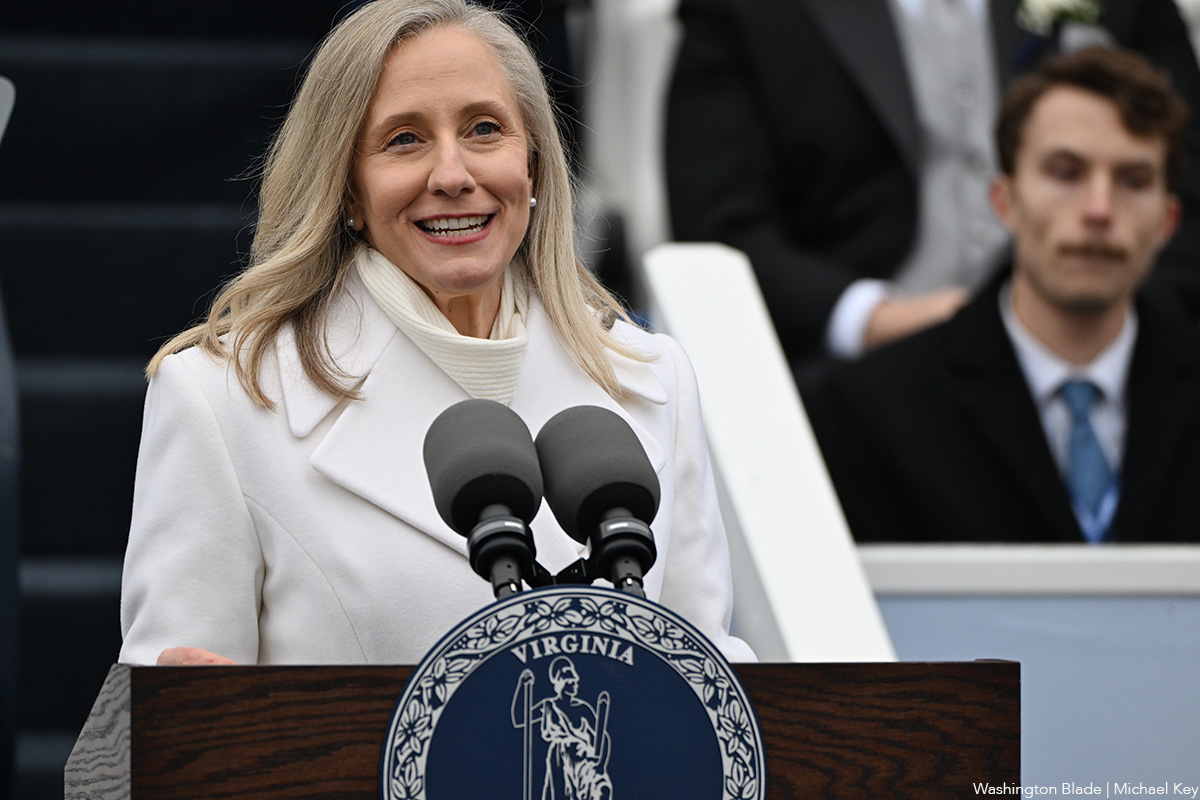
Abigail Spanberger was sworn in as the 75th governor of Virginia at a ceremony on the grounds of the Virginia State Capitol on Saturday. Thousands of spectators watched the swearing-in ceremony and parade, despite the rain and temperatures in the low 40s.
Spanberger, a member of the Democratic Party and an LGBTQ ally, became the first woman to be Virginia’s governor.
View on Threads
Newly-elected Attorney General Jay Jones, Lt. Gov. Ghazala Hashmi, and Spanberger were each administered the oath of office in the public ceremony.
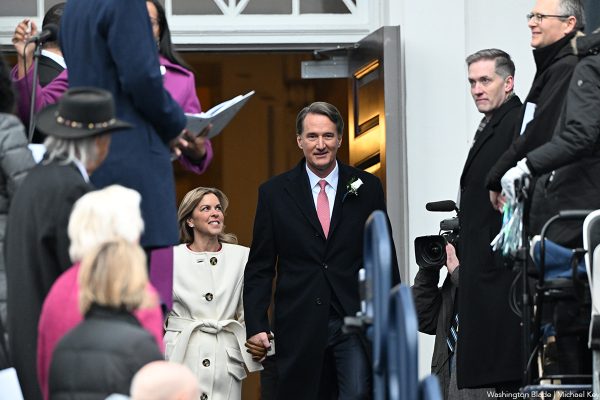
Republican former Gov. Glenn Youngkin left the ceremony shortly after the oath of office was administered to Spanberger and before the inaugural address.
In her speech, the new governor made an appeal to bipartisanship and looking past division in our current moment.
“To my friends in the General Assembly — on both sides of the aisle — I look forward to working with you,” said Spanberger. “I know what it means to represent your constituents, to work hard for your district, and to pursue policies you believe in. We will not agree on everything, but I speak from personal experience when I say that we do not have to see eye-to-eye on every issue in order to stand shoulder-to-shoulder on others.”
Spanberger acknowledged Virginians’ frustrations with federal layoffs and governmental policy.
“I know many of you are worried about the recklessness coming out of Washington. You are worried about policies that are hurting our communities — cutting healthcare access, imperiling rural hospitals, and driving up costs,” said Spanberger. “You are worried about Washington policies that are closing off markets, hurting innovation and private industry, and attacking those who have devoted their lives to public service.”
Spanberger alluded to the Trump-Vance administration, though never mentioned President Donald Trump’s name in her remarks.
Spanberger said, “you are worried about an administration that is gilding buildings while schools crumble, breaking the social safety net, and sowing fear across our communities, betraying the values of who we are as Americans, the very values we celebrate here on these steps.”
The new governor then spoke of her priorities in office, pledging to tackle housing affordability by working to “cut red tape” and increase housing supply. Spanberger also spoke of forestalling an impending healthcare crisis by protecting access and cracking down on “middlemen who are driving up drug prices.”
Spanberger spoke of investments in education at every level, standing up for workers (including the large number of federal workers in Virginia), and taking action on gun violence.
Virginia married couple Mary Townley and Carol Schall witnessed the inauguration ceremony from the stands set up on the grounds of the Capitol. Schall and Townley are one of the plaintiff couples in the case that challenged the Virginia constitutional ban on same-sex marriage.
Same-sex marriage became legal in Virginia in 2014.
“We are delighted with the inauguration of Abigail Spanberger as governor of Virginia,” Schall told the Washington Blade. “The celebration of her inauguration was full of the beautiful diversity that is Virginia. The Virginia Pride contingent was included as a part of what makes Virginia a great place to live.”
“Such an honor to attend such a wonderful event in Virginia history,” Townley told the Blade. “The weather before the Inauguration was cold and rainy, but I believe it represented the end of a dreary time and it ushered in the dry and sunny weather by the end of the inaugural parade. Madam Governor brought us to the light!”
The inaugural parade following the governor’s remarks included a contingent from Diversity Richmond and Virginia Pride. Marchers in the LGBTQ contingent carried a giant Progress Pride flag and were met with loud cheers from the gathered spectators.
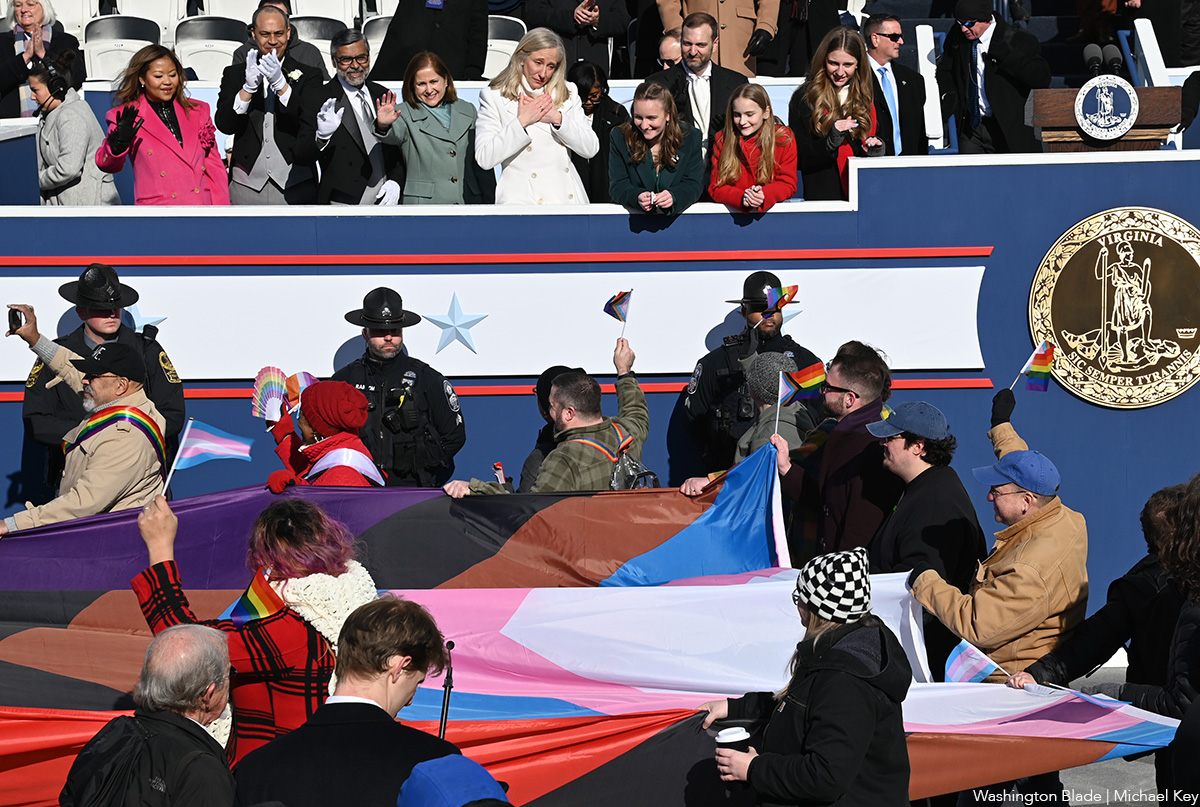
Spanberger after her inauguration signed 10 executive orders. One of them bans discrimination against state employees based on sexual orientation, gender identity, and other factors.
“By virtue of the authority vested in me as Governor under Article V of the Constitution of
Virginia, I hereby declare that it is the firm and unwavering policy of the Commonwealth of Virginia to ensure equal opportunity in all facets of state government,” reads the executive order. “The foundational tenet of this executive order is premised upon a steadfast commitment to foster a culture of inclusion, diversity, and mutual respect for all Virginians.”
Virginia
VIDEO: LGBTQ groups march in Va. inaugural parade
Abigail Spanberger took office on Saturday
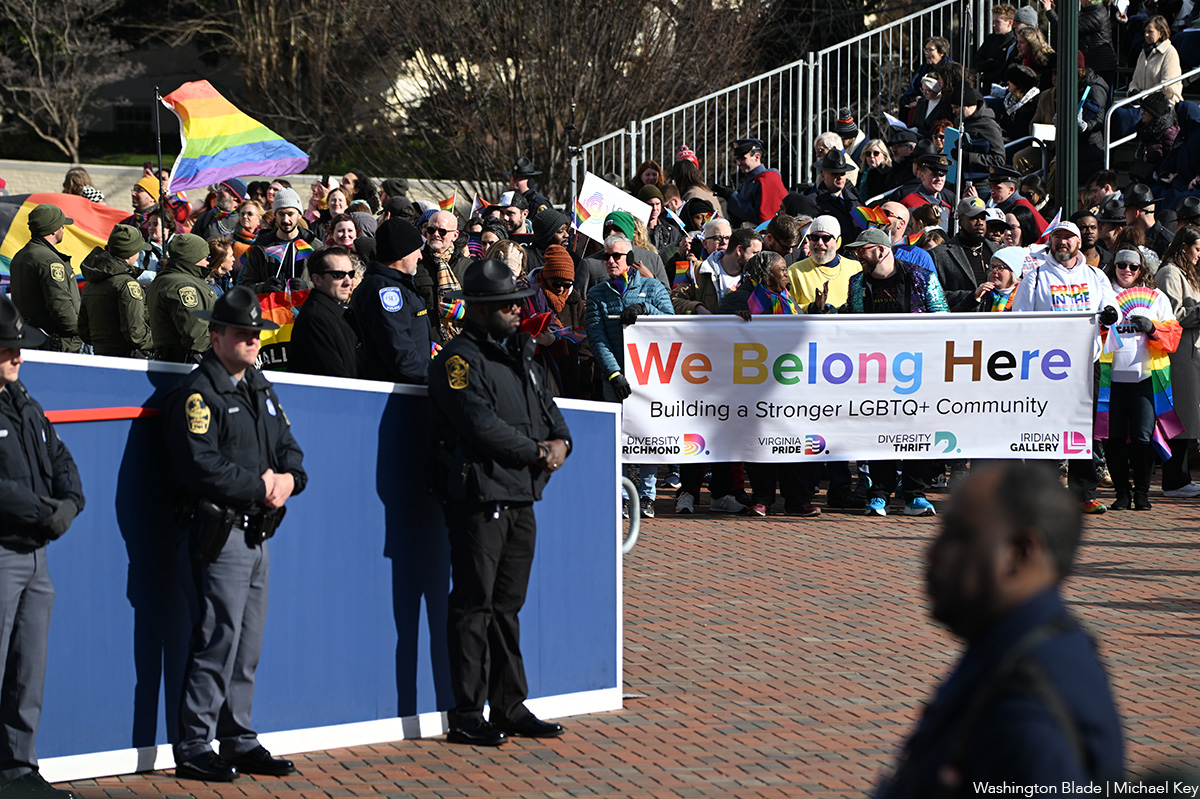
The inaugural ceremonies for Virginia Gov. Abigail Spanberger were held in Richmond, Va. on Saturday. Among the groups marching in the parade were Diversity Richmond and the Virginia Pride project of Diversity Richmond.
View on Threads
